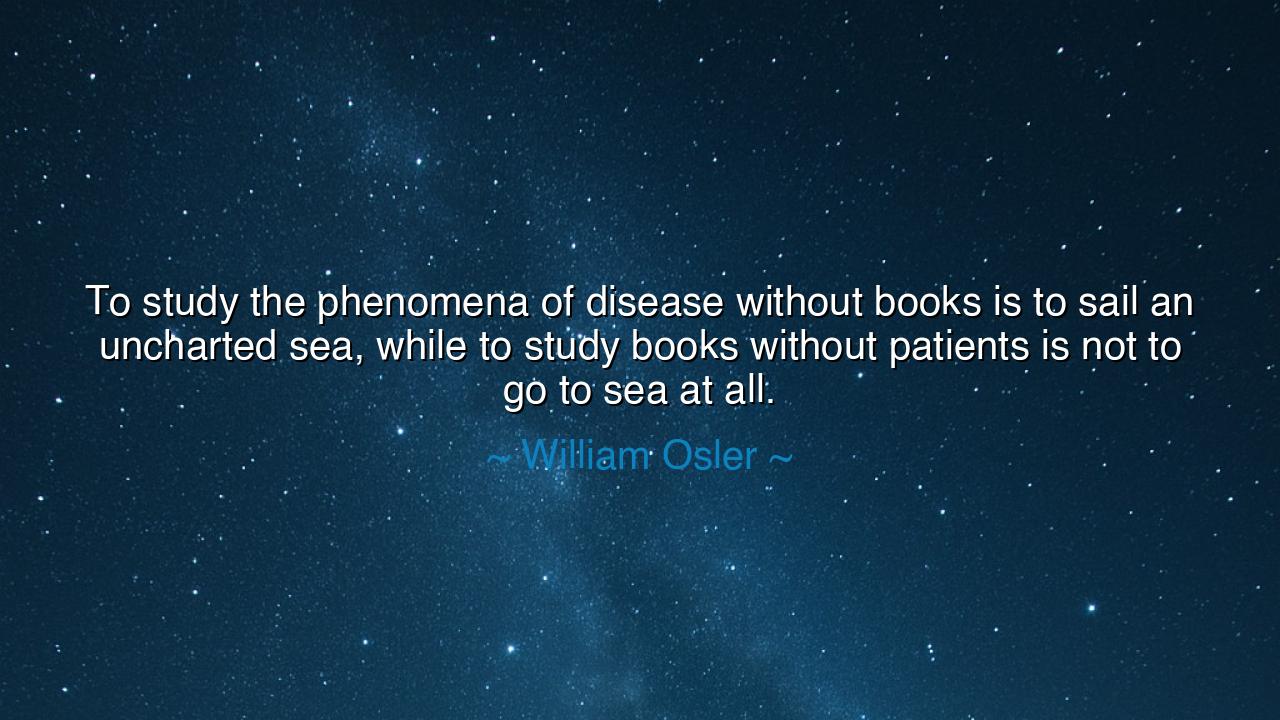
To study the phenomena of disease without books is to sail an
To study the phenomena of disease without books is to sail an uncharted sea, while to study books without patients is not to go to sea at all.






Hear, O seekers of wisdom, the immortal voice of Sir William Osler, who declared: “To study the phenomena of disease without books is to sail an uncharted sea, while to study books without patients is not to go to sea at all.” In this utterance lies not only the counsel of a physician, but the map of a greater truth: knowledge must be bound both to wisdom of the mind and to the living lessons of the world. For books alone are lifeless, and experience without guidance is blind. Together, they form the compass and the voyage, the star and the ship.
The sea of disease is vast and perilous, filled with hidden currents and unseen storms. To sail upon it without the charts of books is to risk being cast adrift, without guidance or anchor. Yet to remain ashore, clutching books alone, is to never taste the salt wind, to never learn the feel of waves, to never gain the true strength that comes from facing the sea itself. Osler, in his wisdom, reminds us that medicine—and indeed all human endeavor—requires both the study of written truth and the courage to live it out in practice.
The books are the inheritance of centuries, the distilled wisdom of healers and seekers who came before. They are the stars drawn upon parchment, pointing the way across the darkness. But the patients are the living ocean, vast and unpredictable, each one carrying mysteries that no book can fully reveal. To neglect either is folly. For the healer who reads without touching the sick knows words without weight; and the healer who treats without learning the words of wisdom wanders without direction.
Consider, O listener, the tale of the great physician Andreas Vesalius in the Renaissance. In an age when medical men read only the words of Galen, Vesalius turned to the bodies of men themselves. He dissected, he studied, he learned from the flesh and bone, and in so doing, he corrected the errors of a thousand years. Had he read only, he would have been blind. Had he studied the body without books, he might have lacked foundation. But by uniting both, he charted a new course for medicine, one that reshaped the destiny of healers forever.
Osler’s words extend beyond medicine. The student of life who clings only to books, who hides behind the walls of study, never learns the fire of reality. And the one who plunges into life without learning from the wisdom of others risks repeating ancient mistakes. Knowledge and experience must walk together like two feet of the same traveler. One without the other is a stumble; together they form the stride that carries us forward.
O children of tomorrow, take this lesson to heart: let your books be your compass, and let the world be your sea. Do not disdain the wisdom of the past, for it lights the way. Yet do not fear the plunge into experience, for it tempers the soul. Respect both the page and the patient, the chart and the wave, and you will walk the path of true mastery in whatever calling you pursue.
Practically, let your life reflect this truth. If you are a student, do not dwell forever in theory—seek application, seek practice, seek reality. If you are a worker, do not labor blindly—read, reflect, and learn from the wisdom of others. Marry the written word to the living deed, and you will find that your journey is neither blind nor empty, but full of power and direction.
Thus Osler’s saying becomes a torch across the ages: books without patients is not to go to sea at all, and patients without books is to sail uncharted. Take both, and you shall chart the seas with confidence, guided by wisdom, strengthened by experience, and destined to reach safe harbors where others are lost.






AAdministratorAdministrator
Welcome, honored guests. Please leave a comment, we will respond soon